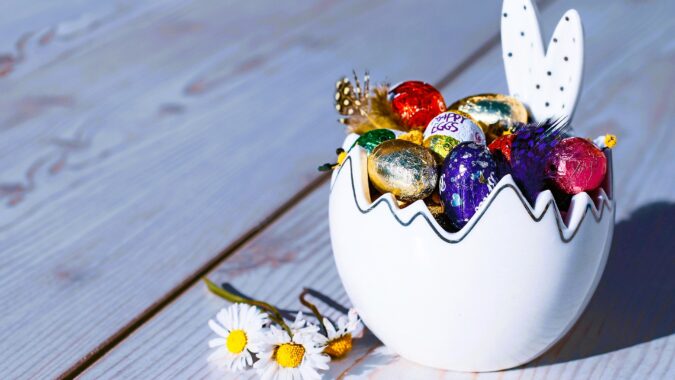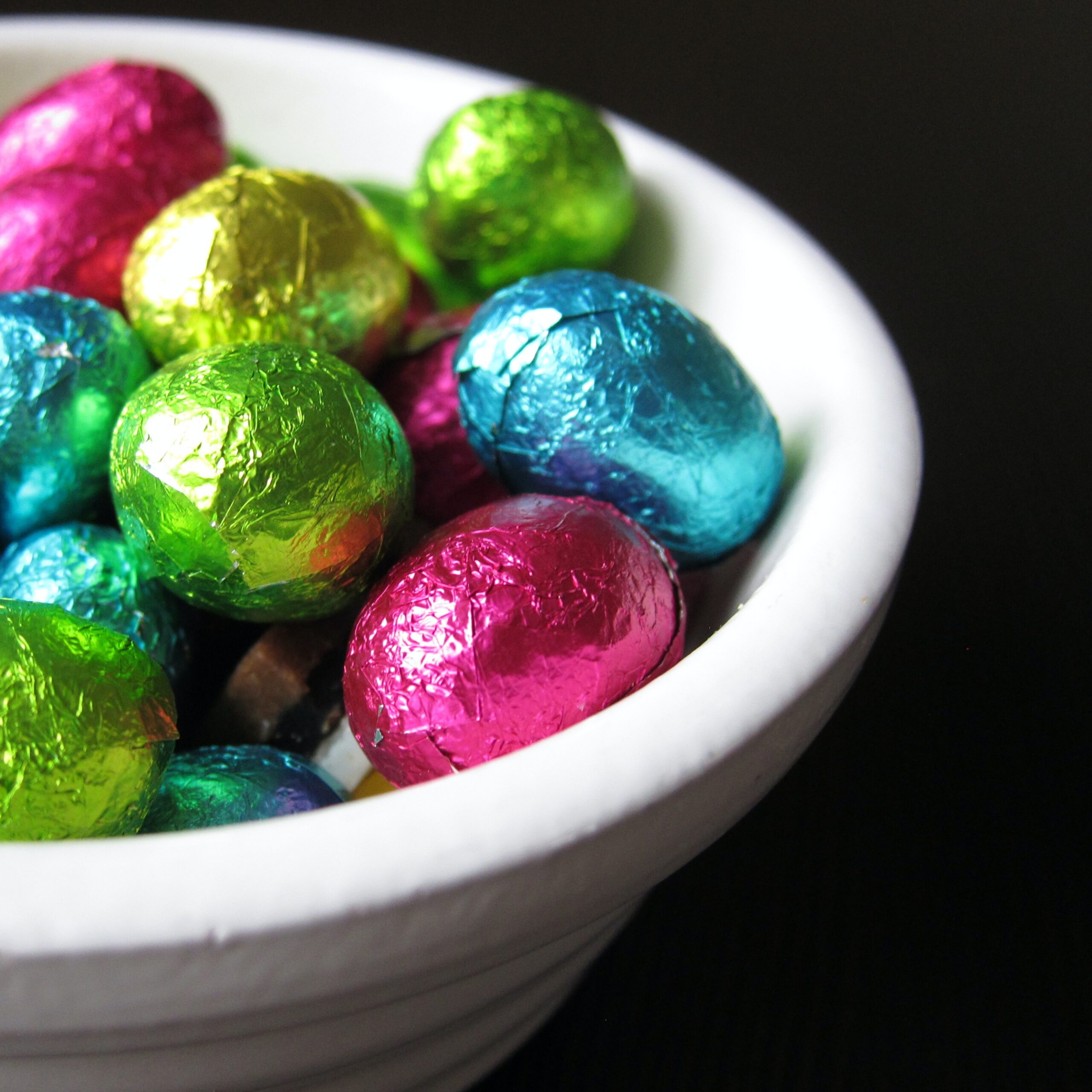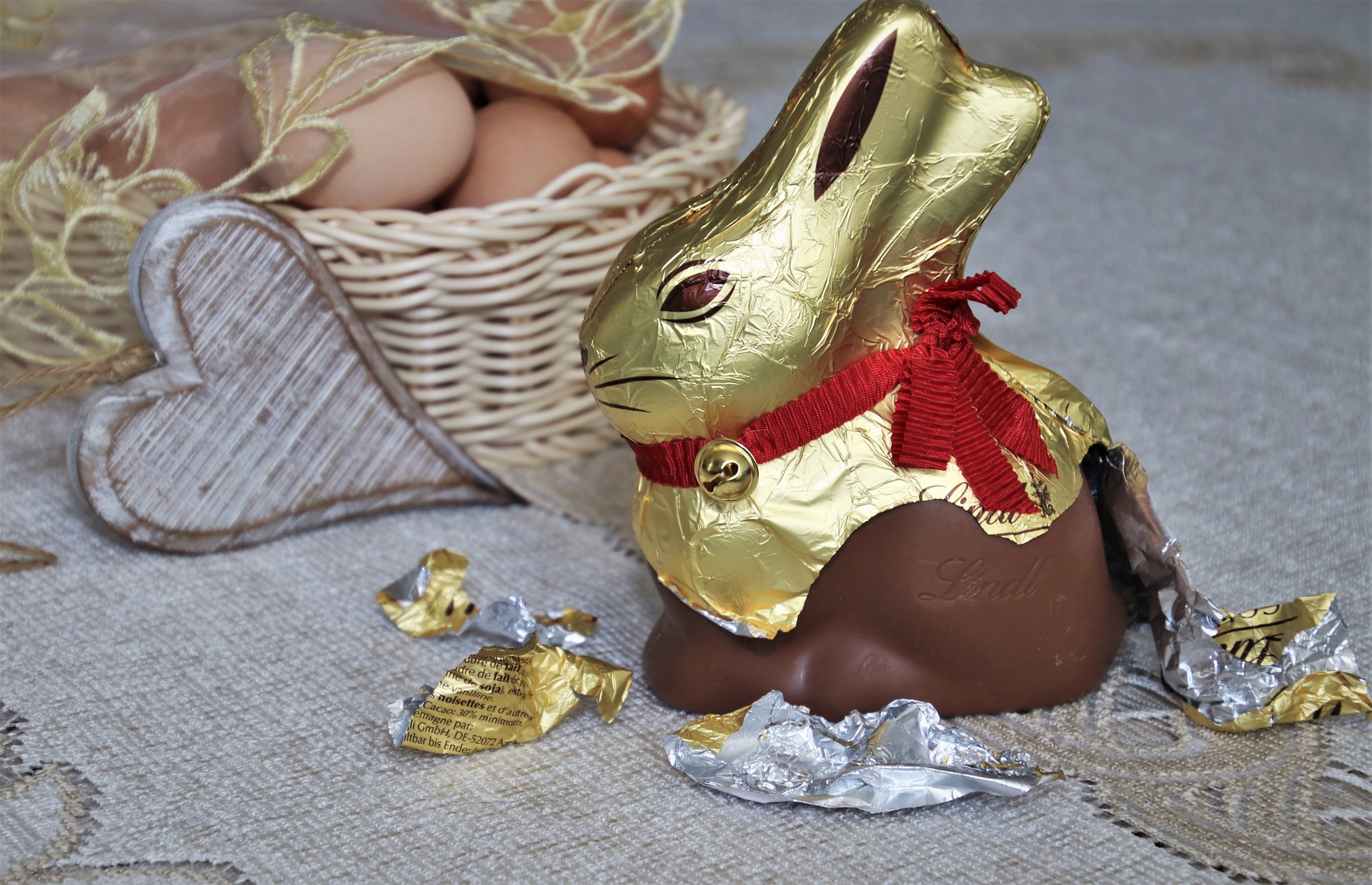Recycling Easter Egg Packaging – is it Easy?
Easter egg packaging recycling is essential to ensure no trace is left behind from the 80 million Easter eggs we buy in the UK every year. Most of us eat all the chocolate (often faster than we’d like to admit). But what we do with the card, plastic, and foil packaging affects the environment.
Chocolatiers and brands focus on bright and colourful Easter egg packaging to attract the attention of both young and older chocoholics. And it works. Who doesn’t associate that purple, red, and yellow splash with a Cadbury Crème Egg? But how easy is recycling Easter egg packaging once you’ve scoffed the chocolate?
Eggsplore some facts about Easter waste, ways to recycle Easter egg packaging, and how to reduce the amount of Easter packaging your household or business uses in this guide.

How to recycle
Easter egg packaging
The good news is that today, most Easter egg packaging is recyclable. Only the plastic windows and some wrappers for sweets, chocolates, and treats that certain Easter eggs include are trickier or impossible to recycle. Most packaging can be recycled in your household or workplace recycling bins but check with your local authority or waste service first.
Separate the individual materials and follow these tips for recycling Easter egg packaging:
- Easter egg foil recycling – clean off any chocolate to ensure it’s clean and to avoid contamination. Scrunch it into a ball the size of your fist, which reduces the risk of small bits falling through or getting caught in the recycling machines. Then place it in your recycling bin.
- Cardboard – take out any plastic windows first and check if there’s any glitter or plastic attached. If so, these can’t be recycled and should go in your general waste bin. Most cardboard Easter egg packaging is recyclable though, just flatten it and place it in your recycling bin or a cardboard or paper bin at work.
- Plastic shell – check the type of plastic the shell is made from (the number in a recycling triangle). Most are PET1, which is the same plastic type used for plastic drinks bottles. Nearly all local authorities in the UK accept these in their household recycling bins, while you can also recycle them in commercial plastic recycling bins.
- Plastic wrappers – look at the back of the wrapper and it should say whether the wrapper is recyclable and/or have a plastic type number. Check whether your local authority accepts these in domestic recycling bins. If not, you can take them to some supermarkets that collect plastic bags and film, as well as a TerraCycle point. Otherwise, they should be disposed of with general waste.

Where can you recycle
Easter egg packaging?
Most Easter egg packaging recycling happens at home. Wherever you live in the UK your local authority or council should provide at least one free recycling bin or box. You can recycle clean and dry cardboard, paper, and foil from Easter egg packaging in these mixed recycling bins.
In 99% of cases, you can also recycle clean and dry plastic Easter egg shells in your household recycling bin. However, check the plastic type first and that it’s recycled by the authority that collects your household recycling bins. If not, you can take some plastic types to supermarkets that have drop-off points for recycling – including plastic bags and wrappers.
Businesses can recycle Easter egg packaging in separate cardboard and plastic waste bins. A convenient choice for many companies is to use dry mixed recycling bins, where you can recycle a combination of materials – including cardboard, paper, plastic, and metals – which covers most Easter egg packaging.
How is Easter egg
packaging recycled?
Once you’ve separated the Easter egg packaging waste, put it in the right recycling bins, and they’ve been collected, what happens next? The recycling process is different for each type of material. Generally, Easter egg packaging is recycled in these ways:
- Foil recycling – when recycling Easter egg foil it’s sorted and recycled alongside other aluminium foil, like foil trays and aluminium drinks cans. It’s all cleaned, compressed, and melted down into raw aluminium. This is used to create new foil sheets, trays, cans, and other products.
- Cardboard recycling – waste cardboard is separated into boxboard and corrugated cardboard and different grades. It’s shredded, mixed with water to form a slurry, and combined with pulp made from wood chips. Finally, it’s filtered, chemically processed, cleaned, dried, and turned into new cardboard sheets.
- Plastic recycling – plastics are sorted and cleaned first. Then it’s shredded into flakes and melted into pellets that are used to create new plastic products. Some recycling uses waste plastic to produce petroleum.

How to reduce
Easter egg waste
The easiest (and tastiest) way to reduce Easter egg waste is to eat all the chocolate and recycle every bit of packaging. Alternatively, you could just avoid buying Easter eggs to prevent producing any waste. But where’s the fun in that? These are a few things you can do to reduce Easter egg waste:
- Buy zero-waste Easter eggs – a zero-waste Easter egg ensures all packaging is recyclable or biodegradable. Many plastic-free Easter eggs are available in UK supermarkets, and plenty are made from recycled materials. Look for these and ones with limited packaging when shopping.
- Make your own Easter eggs – avoid all the plastic and foil packaging by making your own Easter eggs. You’ll need to buy ingredients that come in packaging but look for chocolate bars in recyclable paper and foil packaging. It’s a great way to reuse any plastic Easter egg shells from previous years.
- Recycle packaging waste – simply separate and recycle all Easter egg packaging waste, including the card, foil, and plastic. Make an effort to take any plastics you can’t recycle at home to a supermarket or other collection point to recycle them to eliminate waste.
Looking for more ways to have a sustainable spring celebration? Check out our detailed guide and learn how to have a low waste Easter.
Have your waste collected
Get a fast FREE quote for your waste collection 0800 211 83 90
- Free quote within 1 hr
- Any type of waste
- FREE bins and delivery
- We cover all of the UK